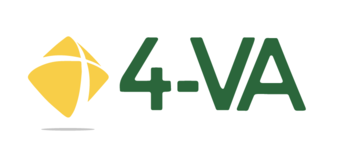
Eleven pilot research projects, submitted from a wide range of departments across George Mason University, will launch July 1, 2022, thanks to funding from the state-sponsored 4-VA program. The 4-VA Collaborative Research Grants are designed to encourage new and innovative research conducted in conjunction with faculty at other 4-VA schools across the commonwealth.
4-VA was established in 2010 based on recommendations from the Governor’s Higher Education Commission and the Governor’s Commission on Economic Development and Job Creation.
4-VA@Mason grants are offered in four broad areas—collaborative research, course redesign, shared courses, and degree completion.
“Our 4-VA@Mason Team, as well as our Advisory Board, were impressed by the depth and breadth of the proposals we received this year,” said Janette Kenner Muir, vice provost, academic affairs, and campus coordinator of 4-VA @ Mason. “From athletic training degrees for marginalized students to green infrastructure, from rural Virginia land ownership trends to avian window collision, there’s going to be a terrific variety of research under our 4VA@Mason banner.”
In addition to promoting partnerships among the 4-VA schools, the Collaborative Research Grants provide seed money to prove out novel concepts, which often go on to receive funding from public and private institutions based on the initial 4-VA catalyst funds.
One such grant goes to Kuo Tian, assistant professor, Department of Civil, Environmental, and Infrastructure Engineering, and Ran Ji, Assistant Professor, Systems Engineering and Operations Research, both in Mason’s College of Engineering and Computing. Together with a colleague at Virginia Tech, the researchers will closely analyze several critical factors in solid waste collection to develop a model for reducing the impact of waste.
U.S. municipal solid waste production is rapidly increasing due to population growth and urbanization, and can create ecological, economic, and societal challenges. With anaerobic digestion on the cusp of providing a promising technology to reduce food waste, it is important to get a clear picture of real-time garbage waste and the prospect and potential of community buy-in. The team plans to partner with the Prince William County Solid Waste Division to conduct research, do community assessments, and provide a blueprint for implementation of the process.
“This subject is of great interest to public agencies,” Tian said. “This grant is the first step to help us provide municipalities with a clear and success-oriented process of execution,” Tian said. “We are very hopeful that with our results, we can scale up the methodology with a subsequent larger research grant.”
In addition to Mason, the 4-VA collective includes the College of William and Mary, James Madison University, Old Dominion University, University of Virginia, Virginia Commonwealth University, Virginia Military Institute and Virginia Tech.
“We look forward to telling the stories that develop from the excellent cross-institutional research that will soon be underway,” said Muir. “Congratulations to the Mason faculty receiving a 2022-23 4-VA @ Mason Collaborative Research Grant.”
The grant recipients are listed below with the principal investigator’s name, grant title, and co-collaborating schools:
— Shelby Broberg, Department of Communication, College of Humanities and Social Sciences (CHSS), “Communication Center Tutor Training Needs Assessment and Open-Access Resource Development.” (partnership with Virginia Tech and James Madison University)
— Amanda Caswell, Professor, School of Kinesiology, College of Education and Human Development (CEHD). “Athletic Training JEDI [Justice, Equity, Diversity, and Inclusion] Increasing Retention and Academic Performance of Athletic Training Students of Marginalized Students Through a Mentoring Program” (partnership with James Madison University, Old Dominion University, and University of Virginia)
— Sabine Doebel, Department of Psychology, CHSS, “How Does Experience Support Working Memory Development in Early Childhood?” (University of Virginia)
— Daniel Hanley, Department of Biology, College of Science, “Coordinated Outreach across Virginia Universities and Behavioral Experiments to Invent Novel Technology that Reduces Avian Window Collision Mortality.” (partnership with William and Mary)
— Younsung Kim, Department of Environmental Science and Policy, COS, “Assessing Green Infrastructure Potential Using Multi-Level Ecological and Economic Factors: The Northern Virginia Case.” (partnership with University of Virginia)
— Nupoor Ranade, Department of English, CHSS, “Ethical Data Analytics: Investigating Data Analytics as a Pedagogical Practice for the Humanities.” (partnership with Old Dominion University, James Madison University, and Virginia Tech)
— Byunghwan Son, Global Affairs Program, CHSS, “Globalization in Reverse: The Diffusion of K-POP in the United States.” (partnership with University of Virginia)
— Kuo Tian, Department of Civil, Environmental, and Infrastructure Engineering, Volgenau School of Engineering. “Decision Support Tools for Smart Municipal Solid Waste Collection.” (partnership with Virginia Tech)
— Levi Van Sant, School of Integrative Studies, CHSS, “Participatory Methods for Land Ownership Research in Rural Virginia.” (partnership with James Madison University)
— Xuan Wang, Electrical and Computer Engineering, College of Engineering and Computing, “Data-driven Prediction and Regulation of Firing Rate Dynamics in the Brain.” (partnership with William & Mary)
— Margaret Weiss, School of Education, CEHD, “Co-teaching in Secondary Inclusive Classrooms: A Professional Learning Series.” (partnership with Virginia Commonwealth University)
For more information, visit 4va.gmu.edu or www.facebook.com/4VAMason.
